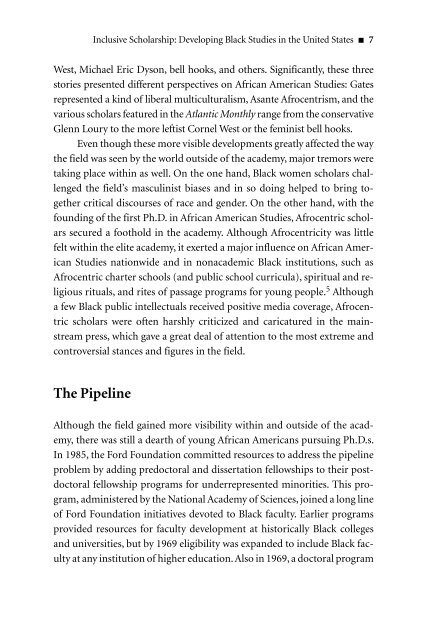Inclusive Scholarship: Developing Black Studies - Ford Foundation
Inclusive Scholarship: Developing Black Studies - Ford Foundation
Inclusive Scholarship: Developing Black Studies - Ford Foundation
You also want an ePaper? Increase the reach of your titles
YUMPU automatically turns print PDFs into web optimized ePapers that Google loves.
<strong>Inclusive</strong> <strong>Scholarship</strong>: <strong>Developing</strong> <strong>Black</strong> <strong>Studies</strong> in the United States 7<br />
West, Michael Eric Dyson, bell hooks, and others. Significantly, these three<br />
stories presented different perspectives on African American <strong>Studies</strong>: Gates<br />
represented a kind of liberal multiculturalism, Asante Afrocentrism, and the<br />
various scholars featured in the Atlantic Monthly range from the conservative<br />
Glenn Loury to the more leftist Cornel West or the feminist bell hooks.<br />
Even though these more visible developments greatly affected the way<br />
the field was seen by the world outside of the academy, major tremors were<br />
taking place within as well. On the one hand, <strong>Black</strong> women scholars challenged<br />
the field’s masculinist biases and in so doing helped to bring together<br />
critical discourses of race and gender. On the other hand, with the<br />
founding of the first Ph.D. in African American <strong>Studies</strong>, Afrocentric scholars<br />
secured a foothold in the academy. Although Afrocentricity was little<br />
felt within the elite academy, it exerted a major influence on African American<br />
<strong>Studies</strong> nationwide and in nonacademic <strong>Black</strong> institutions, such as<br />
Afrocentric charter schools (and public school curricula), spiritual and religious<br />
rituals, and rites of passage programs for young people. 5 Although<br />
a few <strong>Black</strong> public intellectuals received positive media coverage, Afrocentric<br />
scholars were often harshly criticized and caricatured in the mainstream<br />
press, which gave a great deal of attention to the most extreme and<br />
controversial stances and figures in the field.<br />
The Pipeline<br />
Although the field gained more visibility within and outside of the academy,<br />
there was still a dearth of young African Americans pursuing Ph.D.s.<br />
In 1985, the <strong>Ford</strong> <strong>Foundation</strong> committed resources to address the pipeline<br />
problem by adding predoctoral and dissertation fellowships to their postdoctoral<br />
fellowship programs for underrepresented minorities. This program,<br />
administered by the National Academy of Sciences, joined a long line<br />
of <strong>Ford</strong> <strong>Foundation</strong> initiatives devoted to <strong>Black</strong> faculty. Earlier programs<br />
provided resources for faculty development at historically <strong>Black</strong> colleges<br />
and universities, but by 1969 eligibility was expanded to include <strong>Black</strong> faculty<br />
at any institution of higher education.Also in 1969, a doctoral program

















